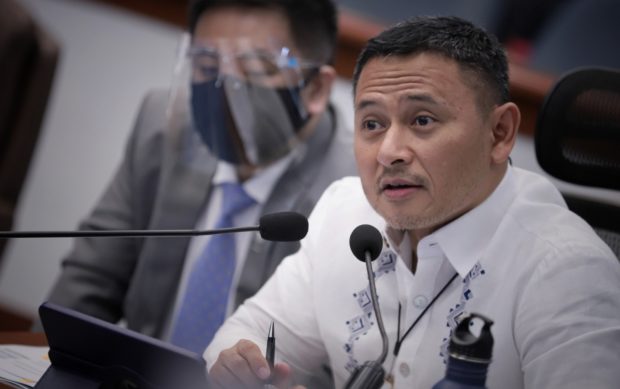
Sen. Juan Edgardo “Sonny” Angara Jr. (Joseph Vidal/Senate PRIB)
MANILA, Philippines — Congress has passed a measure that would extend by two years the June 14 deadline for applications to avail of the government’s amnesty program on delinquent estate taxes.
Sen. Juan Edgardo Angara on Saturday welcomed the House of Representatives’ adoption of his Senate Bill No. 2208, carrying amendments to Republic Act No. 11213, or the Tax Amnesty Act of 2019, which the Senate passed on third and final reading on Monday.
The House of Representatives adopted the approved SB 2208 also on Monday and the bill will now go to Malacañang for President Duterte to sign into law.
Under the measure, which still has no Republic Act number, the current deadline of June 14, 2021, will be extended by two years, or up to June 14, 2023.
“The pandemic is especially hard on seniors who are prevented from going out and overseas Filipinos who could not fly in. Plus, many government offices closed for long periods of time and, when they opened, with fewer personnel,” Angara said.
15 months lost
Angara said the pandemic robbed prospective taxpayers of more than 15 months of transaction time to avail of the tax amnesty, which grants a one-time offer of reduced rates for previous delinquencies.
“[The extension of the law] will be good for the heirs because they can now enjoy the assets; good for the government because collections will increase; and good for the economy because assets will be freed for development,” he said.
The terms of the tax amnesty was spelled out in RA 11213, which slashed the net estate tax from 20 to 6 percent, the amount of which is determined at the time of death of the real property’s owner.
No penalties, surcharges
The estate tax to be paid will be computed after allowable deductions, such as hospitalization costs, the rates of which were increased under SB 2208.
The law also writes off penalties and surcharges, which could be “near the value of the estate if the assessed arrears covers a long period of time,” Angara said.
“But all of these incentives will vanish in smoke if the June 14 deadline of the effectivity of the law (RA 11213) will not be extended,” he said.
The law needed to be extended, Angara said, “because a law, which eases the pain of death, to really help the loved ones left behind, must be given a new lease in life.”
As with the other forms of taxes, estate tax collection plummeted during the pandemic, with only about P2.5 billion from an expected P6.3 billion, according to the senator.
In addition, families reeling from the economic slowdown will be able to unlock assets that will help them “ride out this crisis and, when this is over, the means to rebuild their lives,” he said.
“These assets are crucial for the postpandemic recovery of hard-hit families. And the liberalized rules that free their development and disposition benefits the government with the taxes paid,” Angara said.